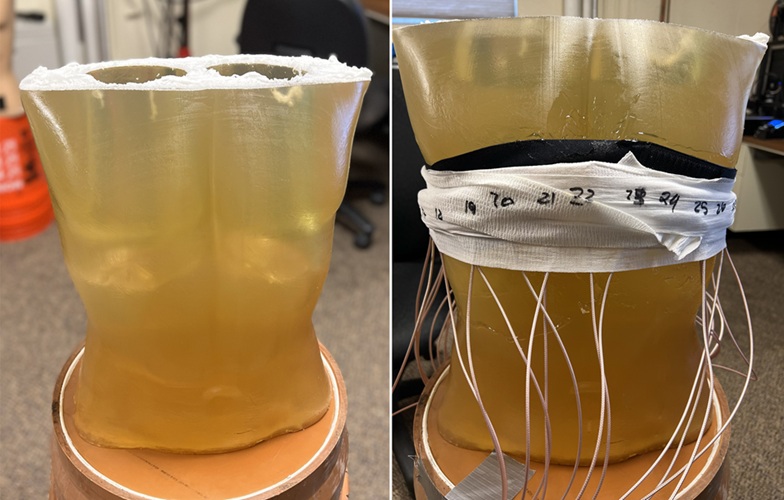Oncology IT Solutions Designed for Cancer Centers’ Radiotherapy Planning
|
By MedImaging International staff writers Posted on 09 Jan 2013 |
A new oncology information technology (IT) product range is comprised of a flexible set of wide-ranging IT systems for every sort of healthcare delivery system, from a single-site clinic to a geographically dispersed, multisite hospital network.
Varian Medical Systems (Palo Alto, CA, USA), a provider of oncology software, has developed a range of oncology-specific information technology (IT) systems designed to meet the needs of a high-tech cancer treatment center. Varian’s FullScale systems exploit virtualization or cloud technologies to deploy Varian software—both the Aria oncology information system and Eclipse treatment planning—in a flexible, scalable, effective, and widely accessible way, enabling treatment centers to exploit the economies of scale.
The FullScale range encompasses three types of deployments that can be adapted to meet the specific needs of each customer: (1) FullScale Appliance is an onsite system for smaller clinics. Varian installs and manages a specially designed turnkey appliance that houses the Aria and Eclipse applications securely behind the customer’s firewall. (2) FullScale Enterprise for larger customers houses Varian applications on virtual servers in the customer’s local data center. Varian installs, upgrades, monitors, and manages the software and system to ensure enterprise-class performance. (3) FullScale Cloud utilizes of virtual servers that are configured on physical servers at an off-site data center, with access permitted only for authorized users. The virtual servers can be moved without disruption from one physical server to another when more capacity is needed, making this the most optimized model for high availability, performance, and scalability in an off-site solution.
“The Varian FullScale Appliance offers the power of a complete and managed system, including Aria and Eclipse components. It allows us to focus on how we utilize Varian technologies to provide enhanced quality patient care instead of spending time on managing the various individual pieces of technology,” stated Randall Miller, chief medical physicist at Northeast Georgia Health System.
“FullScale is designed to minimize the need for capital expenditures and to simplify the processes of upgrading or migrating software, while enabling greater efficiency for a treatment center’s IT, administrative, and clinical staff,” said Kevin O'Reilly, senior director of product marketing for Varian’s oncology systems business. “Clinics using these solutions can avoid buying expensive servers that take up space, use a lot of power, and require extensive IT resources to manage and service. It’s a model that reduces the total cost of ownership and minimizes the downtime needed during upgrades to the system.”
Varian’s Fullscale IT solutions enable cancer treatment centers to embrace the power and promise of both virtualization and cloud offerings.
Related Links:
Varian Medical Systems
Varian Medical Systems (Palo Alto, CA, USA), a provider of oncology software, has developed a range of oncology-specific information technology (IT) systems designed to meet the needs of a high-tech cancer treatment center. Varian’s FullScale systems exploit virtualization or cloud technologies to deploy Varian software—both the Aria oncology information system and Eclipse treatment planning—in a flexible, scalable, effective, and widely accessible way, enabling treatment centers to exploit the economies of scale.
The FullScale range encompasses three types of deployments that can be adapted to meet the specific needs of each customer: (1) FullScale Appliance is an onsite system for smaller clinics. Varian installs and manages a specially designed turnkey appliance that houses the Aria and Eclipse applications securely behind the customer’s firewall. (2) FullScale Enterprise for larger customers houses Varian applications on virtual servers in the customer’s local data center. Varian installs, upgrades, monitors, and manages the software and system to ensure enterprise-class performance. (3) FullScale Cloud utilizes of virtual servers that are configured on physical servers at an off-site data center, with access permitted only for authorized users. The virtual servers can be moved without disruption from one physical server to another when more capacity is needed, making this the most optimized model for high availability, performance, and scalability in an off-site solution.
“The Varian FullScale Appliance offers the power of a complete and managed system, including Aria and Eclipse components. It allows us to focus on how we utilize Varian technologies to provide enhanced quality patient care instead of spending time on managing the various individual pieces of technology,” stated Randall Miller, chief medical physicist at Northeast Georgia Health System.
“FullScale is designed to minimize the need for capital expenditures and to simplify the processes of upgrading or migrating software, while enabling greater efficiency for a treatment center’s IT, administrative, and clinical staff,” said Kevin O'Reilly, senior director of product marketing for Varian’s oncology systems business. “Clinics using these solutions can avoid buying expensive servers that take up space, use a lot of power, and require extensive IT resources to manage and service. It’s a model that reduces the total cost of ownership and minimizes the downtime needed during upgrades to the system.”
Varian’s Fullscale IT solutions enable cancer treatment centers to embrace the power and promise of both virtualization and cloud offerings.
Related Links:
Varian Medical Systems
Latest Imaging IT News
- New Google Cloud Medical Imaging Suite Makes Imaging Healthcare Data More Accessible
- Global AI in Medical Diagnostics Market to Be Driven by Demand for Image Recognition in Radiology
- AI-Based Mammography Triage Software Helps Dramatically Improve Interpretation Process
- Artificial Intelligence (AI) Program Accurately Predicts Lung Cancer Risk from CT Images
- Image Management Platform Streamlines Treatment Plans
- AI-Based Technology for Ultrasound Image Analysis Receives FDA Approval
- AI Technology for Detecting Breast Cancer Receives CE Mark Approval
- Digital Pathology Software Improves Workflow Efficiency
- Patient-Centric Portal Facilitates Direct Imaging Access
- New Workstation Supports Customer-Driven Imaging Workflow
Channels
Radiography
view channel
AI Radiology Tool Identifies Life-Threatening Conditions in Milliseconds
Radiology is emerging as one of healthcare’s most pressing bottlenecks. By 2033, the U.S. could face a shortage of up to 42,000 radiologists, even as imaging volumes grow by 5% annually.... Read more
Machine Learning Algorithm Identifies Cardiovascular Risk from Routine Bone Density Scans
A new study published in the Journal of Bone and Mineral Research reveals that an automated machine learning program can predict the risk of cardiovascular events and falls or fractures by analyzing bone... Read more
AI Improves Early Detection of Interval Breast Cancers
Interval breast cancers, which occur between routine screenings, are easier to treat when detected earlier. Early detection can reduce the need for aggressive treatments and improve the chances of better outcomes.... Read more
World's Largest Class Single Crystal Diamond Radiation Detector Opens New Possibilities for Diagnostic Imaging
Diamonds possess ideal physical properties for radiation detection, such as exceptional thermal and chemical stability along with a quick response time. Made of carbon with an atomic number of six, diamonds... Read moreMRI
view channel
New MRI Technique Reveals Hidden Heart Issues
Traditional exercise stress tests conducted within an MRI machine require patients to lie flat, a position that artificially improves heart function by increasing stroke volume due to gravity-driven blood... Read more
Shorter MRI Exam Effectively Detects Cancer in Dense Breasts
Women with extremely dense breasts face a higher risk of missed breast cancer diagnoses, as dense glandular and fibrous tissue can obscure tumors on mammograms. While breast MRI is recommended for supplemental... Read moreUltrasound
view channel
New Medical Ultrasound Imaging Technique Enables ICU Bedside Monitoring
Ultrasound computed tomography (USCT) presents a safer alternative to imaging techniques like X-ray computed tomography (commonly known as CT or “CAT” scans) because it does not produce ionizing radiation.... Read more
New Incision-Free Technique Halts Growth of Debilitating Brain Lesions
Cerebral cavernous malformations (CCMs), also known as cavernomas, are abnormal clusters of blood vessels that can grow in the brain, spinal cord, or other parts of the body. While most cases remain asymptomatic,... Read moreNuclear Medicine
view channel
New Imaging Approach Could Reduce Need for Biopsies to Monitor Prostate Cancer
Prostate cancer is the second leading cause of cancer-related death among men in the United States. However, the majority of older men diagnosed with prostate cancer have slow-growing, low-risk forms of... Read more
Novel Radiolabeled Antibody Improves Diagnosis and Treatment of Solid Tumors
Interleukin-13 receptor α-2 (IL13Rα2) is a cell surface receptor commonly found in solid tumors such as glioblastoma, melanoma, and breast cancer. It is minimally expressed in normal tissues, making it... Read moreGeneral/Advanced Imaging
view channel
CT Colonography Beats Stool DNA Testing for Colon Cancer Screening
As colorectal cancer remains the second leading cause of cancer-related deaths worldwide, early detection through screening is vital to reduce advanced-stage treatments and associated costs.... Read more
First-Of-Its-Kind Wearable Device Offers Revolutionary Alternative to CT Scans
Currently, patients with conditions such as heart failure, pneumonia, or respiratory distress often require multiple imaging procedures that are intermittent, disruptive, and involve high levels of radiation.... Read more
AI-Based CT Scan Analysis Predicts Early-Stage Kidney Damage Due to Cancer Treatments
Radioligand therapy, a form of targeted nuclear medicine, has recently gained attention for its potential in treating specific types of tumors. However, one of the potential side effects of this therapy... Read moreIndustry News
view channel
GE HealthCare and NVIDIA Collaboration to Reimagine Diagnostic Imaging
GE HealthCare (Chicago, IL, USA) has entered into a collaboration with NVIDIA (Santa Clara, CA, USA), expanding the existing relationship between the two companies to focus on pioneering innovation in... Read more
Patient-Specific 3D-Printed Phantoms Transform CT Imaging
New research has highlighted how anatomically precise, patient-specific 3D-printed phantoms are proving to be scalable, cost-effective, and efficient tools in the development of new CT scan algorithms... Read more
Siemens and Sectra Collaborate on Enhancing Radiology Workflows
Siemens Healthineers (Forchheim, Germany) and Sectra (Linköping, Sweden) have entered into a collaboration aimed at enhancing radiologists' diagnostic capabilities and, in turn, improving patient care... Read more













.jpeg)



